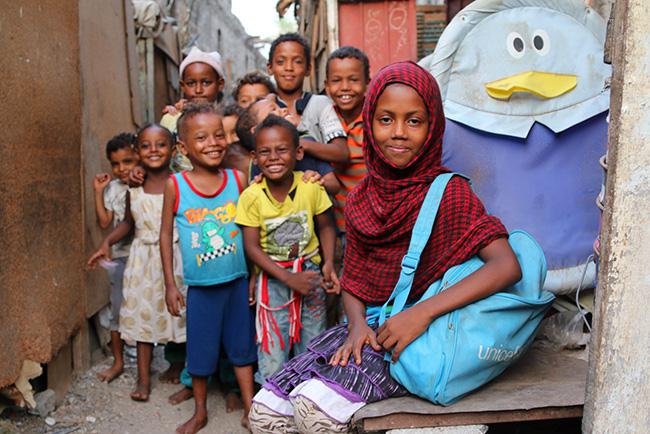
In Yemen’s marginalized Muhamasheen community, children and their families live in poverty on the edge of society, facing discrimination every day. Rania is determined to overcome these obstacles, working hard to stay at the top of her class in school.
ADEN, Yemen, 15 September 2016 – Rania, currently in Grade 8 at Al-Seddek School in Aden, is an incredible 13-year-old girl. Despite many challenges and pressures such as marginalization and poverty, she has continued to attend school, even in the throes of Yemen’s ongoing conflict. Although she is called names by other students and sometimes has to sit on the floor when the room is full, she is currently top of her class.
Rania’s family are members of the marginalized Muhamasheen community, who are stuck at the bottom of the social spectrum in Yemen. Job prospects are low for the people in this community, and when they are able to find work, it is mostly as day labourers with little job security. Even during the current conflict, these social norms prevail.
Rania’s father is currently unemployed, and her mother works as a maid. Between her mother and grandmother, they try everything they can to ensure Rania gets the best possible start in life.
“I will do anything to keep my granddaughter in school. I see myself in her, I don’t want her to end up like me. I want to see her in college, have a respected job and a happy family,” says her grandmother, Hajjah Halima. “She is very smart and doing very well in school. I admire the challenge and courage in her eyes; the patience to face all the challenges she is facing as a marginalized poor child.”
Back to school
The new school year will start at the end of September, and though many of her peers have had easier upbringings, some have already dropped out, while others are still illiterate. Rania will be there as usual on the first day with her UNICEF school bag and pens.
UNICEF is currently running its annual Back2School campaign to help as many students as possible return to regular classes. The ongoing conflict continues to wreak havoc on children’s education, and this initiative provides catch-up classes, learning materials and temporary learning spaces in areas where schools have been destroyed or damaged by fighting.
At the end of the last academic year, just over two million children were out of school. Many will require intensive psychosocial support to help them deal with the horrors of war and keep them in school.
With the generous support and funding of many donors, including the Educate a Child Foundation (Qatar) and the Government of Japan, UNICEF ensures that children receive learning materials and psychosocial support they need to help them stay in school despite the ongoing conflict.
For some children, like Rania, this situation only makes them more determined. “I want to be educated, to be a teacher to teach children and treat them well,” she says. “I want to go to college, to be different from other girls in my area. I love reading books, writing. Children should be in school not out school.”
Source: UNICEF
 FR
FR EN
EN AR
AR








